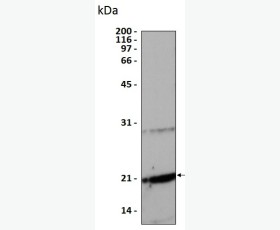Recombinant Human Kallikrein 8/Neuropsin
| Product name: | Recombinant Human Kallikrein 8/Neuropsin |
| Source: | Human Cells |
| Purity: | Greater than 95% as determined by reducing SDS-PAGE. |
| Buffer Formulation: | Supplied as a 0.2 μm filtered solution of 20mM TrisHCl, 150mM NaCl, pH 8.0. |
| Applications: | Applications:SDS-PAGE; WB; ELISA; IP. |
| Storage: | Avoid repeated freeze/thaw cycles. Store at 2-8 oC for one month. Aliquot and store at -80 oC for 12 months. |
| UOM: | 100ug/50ug/200ug/1mg/1g |
| Source | Human Cells |
| Description | Recombinant Human Kallikrein 8 is produced by our Mammalian expression system and the target gene encoding Gln29-GLy260 is expressed with a 6His tag at the C-terminus. |
| Names | Kallikrein-8, hK8, Neuropsin, NP, Ovasin, Serine Protease 19, Serine Protease TADG-14, Tumor-Associated Differentially Expressed Gene 14 Protein, KLK8, NRPN, PRSS19, TADG14 |
| Accession # | O60259 |
| Formulation | Supplied as a 0.2 μm filtered solution of 20mM TrisHCl, 150mM NaCl, pH 8.0. |
| Shipping |
The product is shipped on dry ice/ice packs. |
| Storage |
Store at < -20°C, stable for 6 months after receipt. Please minimize freeze-thaw cycles. |
| Purity |
Greater than 95% as determined by reducing SDS-PAGE. |
| Endotoxin | Less than 0.1 ng/µg (1 IEU/µg) as determined by LAL test. |
| Amino Acid Sequence |
QEDKVLGGHECQPHSQPWQAALFQGQQLLCGGVLVGGNWVLTAAHCKKPKYTVRLGDHSLQNKDG PEQEIPVVQSIPHPCYNSSDVEDHNHDLMLLQLRDQASLGSKVKPISLADHCTQPGQKCTVSGWG TVTSPRENFPDTLNCAEVKIFPQKKCEDAYPGQITDVMVCAGSSKGADTCQGDSGGPLVCDGALQ GITSWGSDPCGRSDKPGVYTNICRYLDWIKKIIGSKGVDHHHHHH
|
| Background | Kallikreins are a subgroup of serine proteases having diverse physiological functions. Growing evidence suggests that many Kallikreins are implicated in carcinogenesis and some have potential as novel cancer and other disease biomarkers. This gene is one of the fifteen Kallikrein subfamily members located in a cluster on chromosome 19. Its encoded protein is secreted and may play a role in suppression of tumorigenesis in breast and prostate cancers. Alternate splicing of this gene results in multiple transcript variants encoding the same protein. |














